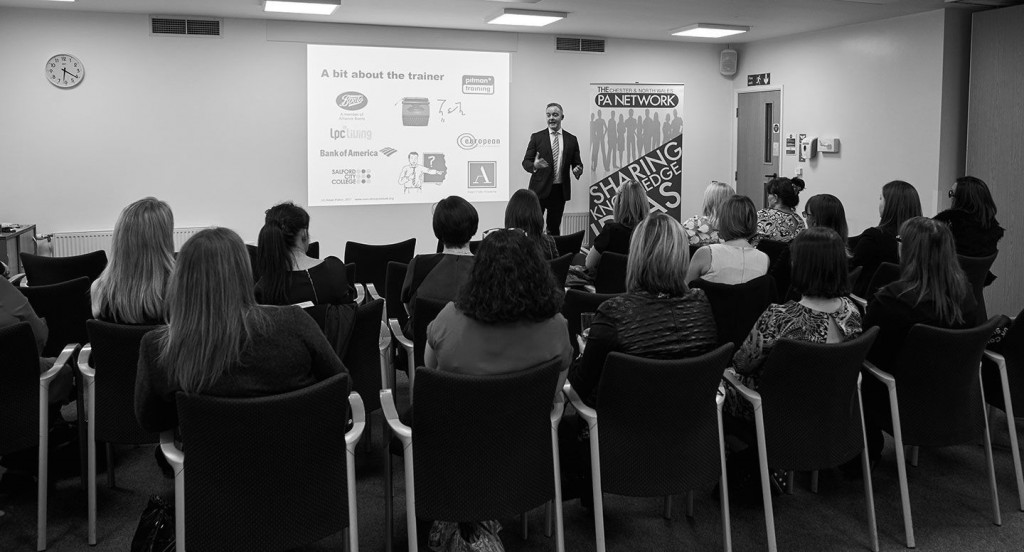We love to see articles that have been produced by Assistants for Assistants, so when we came across this article by Sisii de Winter that highlighted the thoughts of so many PAs/EAs and VAs, we knew that we needed to share with you, the PA Life audience.
Having attended the most inspirational and thought-provoking workshop last week, I made a promise that I endeavour to keep; that I would spread the words and vision that the wonderful Adam Fidler delivered during his course ‘The Strategic Executive Assistant’.
Forget the frustration
I could tail-spin into a biography of the stereotypes of an assistant that no doubt many people in a similar profession have been limited by. However, in the spirit of a positive mindset, I am declaring the perception – that we are glorified photocopying tea makers – as redundant from this point forward.
It was after seeing Fidler speak at a conference in 2016, when I was reasonably new to my current company, that I became adamant that I would take his influence and use the guidance to define my then new role into one that pushed me – and my executive – to our best. Some two years later, I hold that same position however in a considerably developed state than the job description I was originally employed for.
The inspiration came from Fidler’s perception of the future of the role – one I know is shared by others in the industry, however, is not yet at a stage where the historic perception is widely challenged. I am still often being asked ‘what I intend to do next’ and hopefully this acts as insight as to why this position has as much longevity as any other; just as marketing, sales, finance teams etc have durability, so does that of an assistant – within a business operation right.
The potential
The PA/EA role is considered one of the top 25 professions (thank you Glassdoor 2016) – and I believe that is due to the depth of the role – the scope of knowledge we are exposed to is more than anyone in most businesses. It is so much more than an administrative reaction-based position, but one that demands emotional intelligence, stead-fast (diplomatic!) communication alongside drive and care for the team, somewhat unrecognised and at times undervalued attributes but imperative to professional environments.
If we develop internal relationships with confidentiality and care, there is the opportunity to have the ‘ear’ of both the most senior executives as well as the full wider team. A platform can then materialise through which we have the ability to independently influence those two ears and join them to either side of the head, so to speak, thus enabling the brain (business) to function to its best potential.
Across the two day workshop, Fidler rejuvenated a belief I already strongly advocated, that the role of an ‘assistant’ has an essentially endless path of progression.
Consider the capability and impact potential of a CEO. It is not limited or given an endpoint in creative influence and delivery of a business. As such, I believe those who support them – closely – i.e. us, cannot be considered to have one either.
‘The Strategic Executive Assistant’
Fidler endorses a concept of redefining the assistant role, taking into consideration everything from leadership styles and behaviours, the skill of ‘upward management’, techniques of exercising and delivering strategic thinking, to ultimately maximising our professional contribution and effectiveness with absolute conviction. Each individual attribute enhances our ability to create our own independent professional influence within the workplace in our own business operation right – not on the sideline.
During the 2016 conference – and emphasised during the workshop, Adam presented his black box vs red box thinking theory, a method which demonstrates how developed thinking is the first step required for professional growth.
To give a very brief headline summary, ‘black box thinking’ is the traditional element of the role – diary management, typing, filing etc. Reactive and efficient duties that remain pivotal to the role in aiding the day to day functions of an executive.
However moving forward, Fidler implores assistants to develop into ‘red box thinking’ – transcend into proactive and effective duties and balance these with the above. As a start, reflect on the ‘reactive’ work we deliver and whether there is the capability to take on the proactive element of it. Below are some personal examples of traditional duties that can be developed:
- Rather than just collating board and meeting papers, learn to copy-write or contribute to them. Consider and propose agendas in advance for ease and efficiency of your executive. This rewards others with time and grows your knowledge and skill-set.
- Does your executive have time to consider internal development? Research, encourage and deliver change initiatives such as improved internal communications, employee engagement ideas or CSR opportunities. Many executives are not able to give time to non-revenue creativity – this can be your platform.
- Event management shouldn’t be limited to bookings and guest list. Take on the budgeting and pre-event briefing, contribute to the innovation and delivery of the event which you do as a representation of those you support.
Jack of all trades, to the masters of one
As assistants, we are in the unique position to have the ability and aptitude to contribute to almost every element of a business.
Fidler urges assistants to pursue this – attend meetings, do research and be creative – consider what your executive or team members may not have time to execute and take it on.
We are living in a fast-developing era where there are constant new professional innovations; does your executive have time to review culture and reputation enhancing initiatives? How can you, as their affiliate, make your mark and ensure the professional environment is as driven and innovative as you know they want it to be. Develop skills that technology simply cannot overtake.
We are ambassadors and should not just ‘join the dots’, but create them.
Just do it
I have always had a strong belief in the progressive potential of this role and had the good fortune to work alongside executives and teams, past and present, that have granted me the scope to grow it. Since discovering Fidler’s endorsement for the ‘future assistant’ in 2016 and following his and similar work since then I think it’s important that confidence and scope is shared.
I am grateful that I was pushed in the right direction following an informal mentoring lunch with an EA very much at the top of her game, to take the level four course and ensure I was equipped to continue to develop. Fidler gives assistants of all levels the tools and insight to shape our own role and have independent influence within whatever industry and executive we have aligned with – however, the drive must come from us.
The first article I read by Fidler inspiring the above can be found here: https://www.linkedin.com/pulse/why-todays-executive-assistants-need-get-more-strategic-adam-fidler/
Acting on a complete non-commission basis (I promise!), I would urge assistants of any level to take the time to attend one of his courses as found here: https://www.executiveassistant.org/productcourses/.
Find out more about the author of this article: Sisii de Winter.














